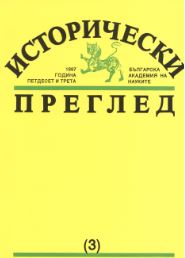Новото в незавършената книга на Александър Бурмов „Образуване и начална дейност на БРЦК“
The New in Alexander Bourmov’s Unfinished Book “Formation and Initial Activity of the BRCC”
Author(s): Krumka SharovaSubject(s): History, Political history, Modern Age, 19th Century, The Ottoman Empire
Published by: Институт за исторически изследвания - Българска академия на науките
Keywords: Ljuben Karavelov; Vassil Levski; Bulgarian National-Revolutionary Movement; Bulgarian Emigration
Summary/Abstract: In 1963, in his article “V. Levski’s Formation as a Revolutionary” A. Bourmov reported that it represented a generalized exposition of the work prepared by the author “Formation and Initial Activity of the BRCC”. Pieces of information about that and about the author’s plans for a study on the revolutionary movement within broader chronological limits are found also in A.Bourmov’s personal archives. There a full manuscript of the envisaged book is absent, though. The questions of its contents, in their majority, were elaborated and published by the eminent Bulgarian historian of the revolutionary movement in the 50s, between 1960 and 1966 in the journal “Historical Review” and in the “Bulletin of the Institute of History”. He engaged in active work on the theme of L. Karavelov, his ideology and revolutionary activity in the preparation of the three-volume publication “Selected Works” of Karavelov (1954–1956) where in Volume III is included his preface to this theme (1956). His occupation with L. Karavelov’s creative work, with his publicistic writings in particular, as well as the discussion that began in the 50s on the BRCC, the ideology of Levski and Karavelov and the relations between them were of decisive importance for the scholar to draw conclusions different from the earlier once on the BRCC, Levski and Karavelov. These circumstances determined A.Bourmov’s decision to return to the problems of the BRCC which he had examined in his book dedicated to it (1943), preceded by articles of Levski’s activity and to revise some of his views on fundamental issues. In the present article are reviewed the published parts of A.Bourmov’s unfinished book, his new findings and elaborations on the basis of hitherto unused Bulgarian and foreign sources and his contribution to the clarification of the controversial questions concerning the early history of the BRCC, the ideological course of Levski and Karavelov and their joint work on the new organization up to the middle of 1871. A.Bourmov’s following publications are analysed: the two already mentioned articles on the ideology of Karavelov and Levski, the two parts of his work on the Clandestine Central Bulgarian Committee (the third, promised by the author, about its historical importance and role has not been published), as well as his articles “The Bulgarian National-Revolutionary Movement and the Bulgarian Emigration Bourgeoisie in 1867–1869”, “Did the Central Revolutionary Bulgarian Committee exist in Bucharest in 1869–1872”, “L. Karavelov and the Establishment of the BRCC in Bucharest”, and his last, posthumously published work “The Struggle for Ideological-Revolutionary Purity of the BRCC in Bucharest (1869–1871)”. These are all pieces of research that refer to the core of the problem of the foundation and initial activity of the BRCC, prepared by the author as parts of the planned work. In her historiographic study Kr. Sharova pays attention to the following interpretations, new both for A.Bourmov and for historical science, of the problem: 1. A. Bourmov now – and for the first time in the historical literature – shows in greater detail and accurately the gradualness in the evolution in the political and organizational views of Levski and his progress to the idea of the BRCC (in the past, and some people even nowadays, believed that his new ideas emerged all of a sudden). 2. At variance with his previous studies he now provides abundant documentary material on Karavelov’s most energetic participation in creating and defining the ideology and organizational views of the BRCC. 3. He proves that the BRCC was set up in Bucharest in the first half of October 1869 (earlier he accepted April 1870) by Levski, Karavellov and a group of former participants in the “Young Bulgaria” group, that the two worked together in it and the Committee was active up to 1872 (earlier he regarded Levski as the main initiator and sole creator of the idea of the BRCC and the internal committees and that no co-operation existed between him and Karavelov. 4. A.Bourmov follows up step by step the state of the emigration and the inner differences n it, stressing Karavelov,s major role in overcoming the residues of dualistic, chetnik and other moods and for the first time establishes that this was one of the factors also for Levski to stand aloof from the persona who did not accept the new principles of the BRCC. 5. Without hesitation he characterizes Karavelov’s ideas revolutionary-democratic and assumes that they were the main source for the formation of Levski as a revolutionary and a democrat. (This was absent in his former works.) On account of the great importance of these researches of A. Bourmov, the authoress of the article suggested that they should be published as a separate book.
Journal: Исторически преглед
- Issue Year: 1997
- Issue No: 3
- Page Range: 97-138
- Page Count: 42
- Language: Bulgarian
- Content File-PDF

